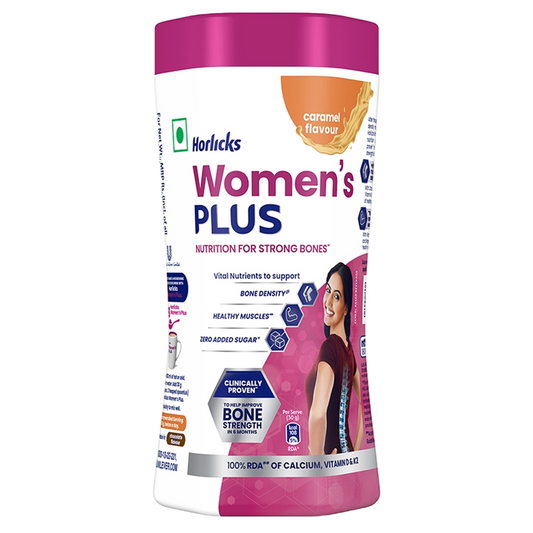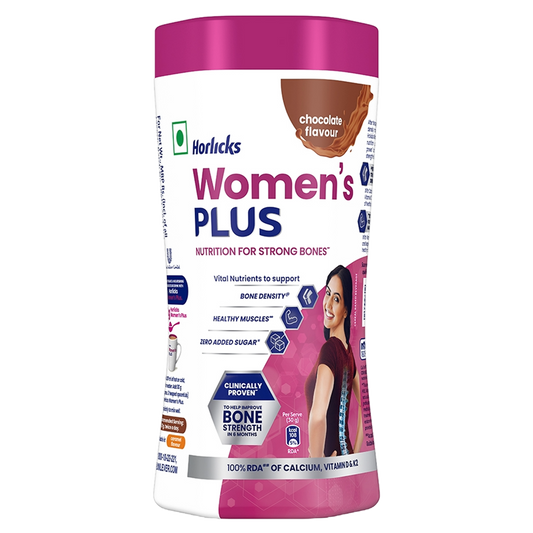Did you know that women are at a higher risk of developing osteoporosis, a condition characterised by weak and brittle bones? This is mainly due to hormonal changes and a higher likelihood of calcium deficiency. Calcium is a vital mineral that plays a crucial role in maintaining strong bones and overall health, making it essential for women to pay close attention to their calcium intake.
So if you’re pacing back and forth worrying about how to strengthen your bones, we’re here to tell you all about it. Let’s explore how to increase bone calcium and discuss the best calcium-rich foods for bones you can incorporate into your diet.

How Much Calcium Does A Woman's Body Need?
Calcium requirements vary depending on age, sex, and life stage. The National Institutes of Health (NIH) Office of Dietary Supplements recommends the following daily calcium intake for women:
- Ages 19-50: 1,000 mg
- Ages 51-70: 1,200 mg
- Ages 71 and older: 1,200 mg
Pregnant and breastfeeding women aged 18 and younger require 1,300 mg of calcium daily, while those aged 19-50 need 1,000 mg.
Why Do Women Get Calcium Deficiency?
There are several factors that contribute to calcium deficiency in women. These are:
- Lack of calcium-rich foods in the diet
- Certain medical conditions, such as lactose intolerance or celiac disease, can impair calcium absorption
- Hormonal changes, such as those that occur during menopause, can also affect calcium metabolism
- Inadequate vitamin D levels and a sedentary lifestyle can also lead to poor calcium absorption and utilisation
How To Increase Bone Calcium: Best Calcium-Rich Foods For Bones
1. Soy Milk
Soy milk is one of the best sources of calcium for bones for women who are lactose intolerant or want a plant-based option. It is often fortified with calcium and provides around 300 mg of calcium per cup, which is about 244 gm.
2. Seeds
Seeds like sesame seeds and chia seeds are excellent sources of calcium. Just one tablespoon (9 gm) of sesame seeds contains about 87.8 mg of calcium, while one ounce (28.35 gm) of chia seeds provides approximately 179 mg.
3. Yoghurt
Yoghurt is not only rich in calcium but also contains probiotics that promote gut health. One container of nonfat, plain, greek yoghurt can provide around 187 mg of calcium.

4. Cheese
Cheese is another calcium-rich food, with hard cheeses like cheddar and parmesan providing the highest amounts. A 100-gram serving of cheddar cheese contains 710 mg of calcium, while a 100-gram serving of parmesan cheese contains around 853 mg. Enjoy cheese in moderation, as it can be high in saturated fat and sodium.
5. Almonds
Almonds are not only packed with calcium but also provide healthy fats, protein, and fibre. One ounce of 23 whole kernels (28.35 gm) provides approximately 76.3 mg of calcium.
6. Beans And Lentils
Beans and lentils are rich in calcium, protein, and fibre, making them one of the best calcium foods for bones. One cup (198 gm) of cooked lentils can provide about 37.6 mg of calcium, while one cup (193 gm) of pinto beans contains about 218 mg of calcium.
7. Canned Fish
Canned fish, such as sardines and salmon, are excellent sources of calcium, thanks to their edible bones. One can (about 3 oz, 92 gm) of canned sardine provides approximately 351 mg of calcium, and 3 ounces (85 gm) of canned salmon contains about 168 mg. These fish are also rich in omega-3 fatty acids, which promote heart and brain health.
8. Tofu
Tofu, made from soybean curds, is an excellent source of calcium, particularly when prepared with calcium sulphate. Half a cup (124 gm) of tofu (prepared with calcium sulphate) can provide about 434 mg of calcium.
9. Figs
Figs are a delicious and calcium-rich fruit that can be enjoyed fresh or dried. One large (64 gm) raw fig contains 22.4 mg of calcium while one cup (149 gm) of dried figs contains about 241 mg.

How To Increase Bone Calcium: The Horlicks Way
Horlicks Women’s Plus is a specialised bone nutrition expert fortified with the revolutionary CALSEAL formula. This exceptional nutritional beverage is specifically designed to cater to the unique needs of women. Packed with essential nutrients, it offers a convenient and effective way to meet 100% of the recommended daily allowances (RDA)^ for Calcium, Vitamin D, and Vitamin K2.
Incorporating Horlicks in your daily diet can help you significantly with improving and maintaining your bone health and overall well-being. Try it today!
The Takeaway
For women to keep strong and healthy bones throughout their lifetimes, increasing bone calcium is essential. A sufficient calcium intake, along with regular exercise and adequate vitamin D levels, can help avoid calcium deficiency and lower the risk of osteoporosis. You may considerably be able to achieve your daily calcium needs by including calcium rich foods for bones like soy milk, seeds, yoghurt, cheese, and more in your diet. Always seek the advice of a medical practitioner for personalised recommendations on calcium consumption and bone health.
FAQs
1. Why Do Women Need More Calcium?
Women need more calcium because they have a higher risk of developing osteoporosis, a condition characterised by weakened and brittle bones. Calcium is essential for maintaining strong bones and teeth, and women's calcium needs increase during periods such as pregnancy, breastfeeding, and menopause.
2. What Is Normal Bone Density For A Woman?
Bone density is typically measured using a test called dual-energy X-ray absorptiometry (DXA). A T-score is used to compare an individual's bone density to that of a healthy young adult of the same sex. A T-score between -1 and +1 is considered normal. A T-score of 1 to 2.5 indicates low bone mass. A T-score of 2.5 SD or more may indicate the presence of osteoporosis. It is recommended to perform this test and conclude results only under the supervision of a medical professional.
3. What Happens If Women Don't Get Enough Calcium?
If women don't get enough calcium, they may be at a higher risk of developing osteoporosis and experiencing fractures or bone loss. Inadequate calcium intake can lead to a decrease in bone density, making bones more fragile and susceptible to fractures. This is why calcium rich foods for bones are of utmost importance.









